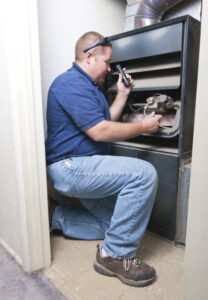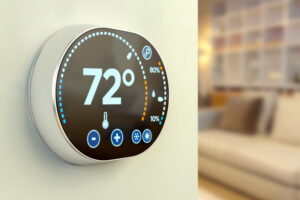As we head into the most humid time of the year in New Jersey, you may be wondering what you can do to reduce excess humidity in your home. Even though your air conditioner removes humidity as part of the cooling process, your AC will need to work harder in order to sustain the temperature at which you set your thermostat when humidity is high. But there is a way to help your air conditioner through periods of excessive humidity that can help you be more comfortable, too: consider installing a whole-home dehumidifier to your air conditioner in Waldwick.
What Happens When You Dehumidify?
The comfortable range for humidity is anywhere from 30-60%. During June, July, August and September, the humidity averages for New Jersey are anywhere from 58-87%. To dehumidify the air, a dehumidifier collects the air around it, runs the air over cool coils, pulls the excess moisture from it, and sends the air back dry. The water from the humidity is removed from the house via the condensate pipe that drains into your sewer. Typically, a dehumidifier is set to a specific humidity level so that the space doesn’t become too dry. When you consider how much extra humidity we can have during the summer months, it is easy to see where a dehumidifier can benefit your home and air conditioning system.
Other Benefits of a Whole-Home Dehumidifier
There are other benefits to installing a whole-home dehumidifier other than making your space more comfortable:
- Help with allergies – allergies can be exasperated by excessive moisture in your home. Not only does moisture promote mold and mildew growth, dust mites flourish with it. By removing the excess moisture in your indoor air, you can help prevent mold, mildew and dust mites from proliferating.
- Better energy efficiency – your air conditioner can remove only so much humidity. In times of excess humidity, it will have to work harder to achieve the same level of comfort in your home. By giving it a boost in the form of a dehumidifier, you’ll help your AC to run more effectively and efficiently.
- Less strain on your system – when it’s hot and humid, it is inevitable that your air conditioner will be working more. Having a tool that helps remove the excess humidity means your system doesn’t have to overwork to make everyone comfortable.
Don’t Like That Sticky Feeling? Call Us
Humidity makes everything feel heavy, icky and sticky, and it feels the same to your air conditioner. Help your AC work more effectively and efficiently by considering the installation of a whole-home dehumidifier.
DB Heating & Cooling experts are here to help answer any questions you may have about installing a whole-home dehumidifier in Waldwick, so give us a call.
Continue Reading
Tags: Dehumidifier, Waldwick
Posted in Indoor Air Quality | Comments Off on How Does a Whole-Home Dehumidifier Work?
 The last thing any New Jersey homeowner needs in the middle of winter is a heating system that’s malfunctioning, right?
The last thing any New Jersey homeowner needs in the middle of winter is a heating system that’s malfunctioning, right?
